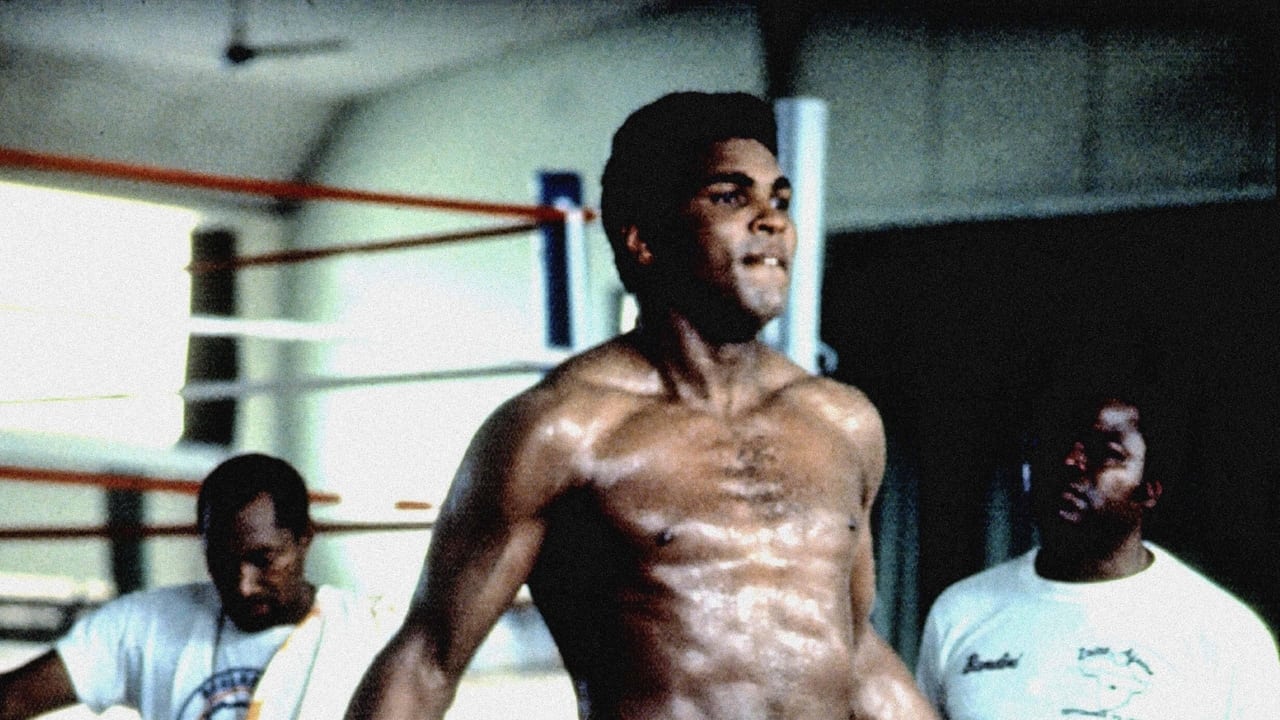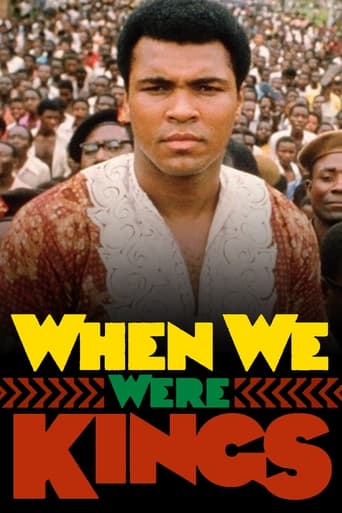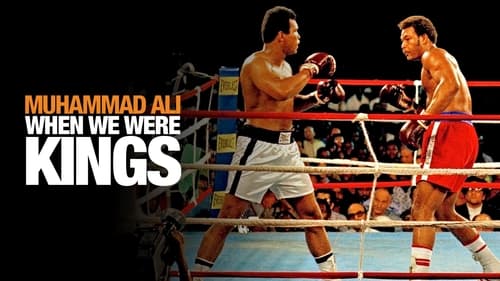



Too many fans seem to be blown away
I wanted to like it more than I actually did... But much of the humor totally escaped me and I walked out only mildly impressed.
View MoreThe movie turns out to be a little better than the average. Starting from a romantic formula often seen in the cinema, it ends in the most predictable (and somewhat bland) way.
View MoreExcellent characters with emotional depth. My wife, daughter and granddaughter all enjoyed it...and me, too! Very good movie! You won't be disappointed.
View MoreTo anyone born after Muhammad Ali's heyday as a boxer, it would be difficult to describe the impact he had on American life and culture. Sure, one can read about it and watch other documentaries, but there's something to be said about experiencing it in real time with Ali's name in the headlines, proclaiming himself to be The Greatest both in and out of the ring. "When We Were Kings" is probably an inappropriate title for this film, it plays more like "When Ali Was King", even though he wasn't World Champ at the time, having been stripped of the title for refusing the military draft. The picture does a credible job of presenting the behind the scenes machinations to bring the 'Rumble in the Jungle' to fruition, even with a six week delay due to a training injury suffered by Foreman.Thinking back to those days, I had never considered the implications of making the fight a black political statement, though in hindsight I would question allowing the involvement of a dictator like Mobutu Sese Seko putting up the money for the event. As described by Norman Mailer, one of the writers interviewed for the film, Mobutu was a closet sadist who rounded up a thousand criminals and put them in detention pens underneath the fight stadium to remove the threat of criminal activity while the eyes of the world were on his country.Don't expect to see a lot of the eight round fight in this documentary. What you need to know is capably explained by Mailer and fellow sportswriter George Plimpton laying out Ali's strategy and how he approached the fight. Mailer's analysis in particular is helpful in detailing how Ali's right hand leads so enraged Foreman that he used up a lot of his power and energy in trying to destroy him. Quite honestly though, I don't know quite what to make of the 'succubus' story that Plimpton seemed to be so fascinated with.Perhaps the most significant take away I had from the picture was hearing Spike Lee's comments that had nothing to do with the fight. He was speaking of black youth, but I would ascribe his remarks to all colors of a young generation today that remain completely unaware of history, and even worse, are disinterested in learning about it. Most certainly, Muhammad Ali would have something to say about that.
View MoreThe story of Muhammed Ali and the famous "Rumble in the Jungle" is the stuff of legend; the world's best boxer becomes a hate figure for middle America and is banned for political reasons; he returns but has lost his edge; he gets a last shot at the world title in a fight to be held in Zaire, whose kleptomaniac dictator is willing to put up his people's cash to pay for it; and against all the odds, he astonishingly beats the superior puncher George Foreman through a combination of wit and bravery. Ali was beautiful and clever as well as violent; his "art" destroyed him, but it's easy to tell his story as a kind of noble myth. Which is exactly what 'When We Were Kings', a documentary that relies relatively little on talking heads (because the whole drama was a kind of performance, and filmed) does. The film even gets its soundtrack for free thanks to the musicians brought in to publicise the fight. I don't even like boxing, but it's still a compelling story; but also watch 'Thrilla in Manilla', a film about Ali's next fight, for a story that takes something of the gloss of his personal sheen.
View MoreSome people see boxing as nothing more than two people standing in a big square that for some reason is called a ring, hitting each other very hard until one of them falls over bleeding onto the floor. Others see it as a tough, graceful sport that can be elevated to an art form. If any one person has ever exemplified the idea of boxing as an art, surely it is Muhammad Ali.Mostly shot in 1974, When We Were Kings follows the circus that was the famous 'Rumble In The Jungle', the fight between Ali and George Foreman that took place in Zaire now the Democratic Republic of the Congo - in 1974. However to say that this movie is about that match is to do it an injustice. Really this is a movie about Ali himself, and what the man has come to represent.The title actually refers to the time when black people were kings of Africa, yet it is interesting to note that the only reason the fight took place in Zaire was the massive amount of money offered. Indeed Zaire, under the rule of Presedent Mobutu, was hardly a place where the common person thrived. Much is made of President Mobutu. He is described as a 'closet sadist', and there is discussion of detention rooms and prisons for thousands for people under the stadium the fight was take place in! The most frightening accusation aimed at the president is the idea that he rounded up all of the dangerous, high ranking criminals in the country, randomly killed 100 of them and released the others, just to ensure that, while the eyes of the world were on Zaire, there would be no criminal trouble. Whether or not that is true, there certainly was little trouble at all.In 1967 Ali lost the world title because he had refused to go to Viet Nam, famously saying 'no Vietnamese ever called me Ni**er', but began a comeback in 1970. In 1971 he had a shot at the title but lost to Joe Frazier. This is very important to remember as in 1974 Ali was fighting Foreman, a person who obliterated Frazier in a couple of rounds. Nobody really thought Ali was going to win this fight, a fact made clear by the documentary. Nobody, from his training staff to the commentators, believed that the former champion could stop 'Big George', no one except the people of Zaire. Everywhere Ali went there were cheers of 'Ali, Bomaye!', which means 'Ali, kill him!' I found it quite interesting when in one interview Foreman says that he wouldn't want people shouting that - a chant encouraged by Ali - but rather that the people would shout 'George Foreman loves Africa!' However in the eyes of the people of Zaire, Foreman represented America, while Ali was their champion.As well as interviews with the fighters and those associated with them there is also a lot of coverage of the massive amount of hype that went along with the match. Don King ensured that this fight was massive, and the hype that surrounded the fight, with artists such as James Brown and B.B. King performing bought anticipation to a fever pitch. Called the 'Black Woodstock' music festival, I found the emphasis the film placed on these artists and what they did just as compelling as the information about Ali.Of course there is also the fight. I must say that this was the one point of the documentary that worried me. It depicted Ali as taking a huge amount of damage during the match, on his last legs before taking the fight to Foreman. I feel that this was simply for dramatic effect. Even during the fight it was noted that Foreman was tiring himself out and Ali's tactics seemed obvious to everyone except his opponent in the ring. But this small criticism cannot overshadow what an amazing feat it was for Ali to floor Foreman in the eighth round. The final punch Ali lands is amazing, as is his performance throughout the fight.This film may not appeal to people who find boxing offensive, yet in truth the fight itself is not the main interest. Here we see people talking abut a man who during a time of massive social upheaval was a leader for his people. As Spike Lee says towards the end of the movie 'These kids, they are missing a whole lot if they don't know the legacy of Muhhamad Ali because no matter what era you live in you see very few true heroes'.
View MoreWell, although I am not too much of an Ali fan, I heard some of the important moments of his life. You probably know him as that draft dodger who almost got 5 years in federal jail for refusing to be inducted into the U.S. armed forces. And of course, there was the Ali-Foreman matchup taking place in an African country where you can get by with some French, and you heard about King Motu from Zaire and Don King from the USA masterminding this famous fight.What makes this movie better than Will Smith's version of "Ali" was the music. If you have seen that version of "Ali", there are the same patterns---you hear the "Bumaye Ali" chant (which was a motivator for Ali to knock out George Foreman) like Will Smith's version, and the big pre-game fanfare with all of that Black music, leading to the entrance of Ali and Foreman into the big stadium with a lot of soldiers. But the music in "When We Where Kings" added a great fuel to the fire of what was this famous boxing match to come.I found out that Motu could not see the famous fight in person at the stadium, because Motu was targeted for an attempt on his life by someone.The early 1970s was when the soul music and progressive rock explosion went sky-high. This was in response to the turbulent Civil Rights movement of the mid-1960s in the United States, leading up to the turbulent events in 1968 such as the Martin Luther King assassination. Especially when you hear James Brown and his famous Soul Generals band strut their stuff with famous soul hits like "We're Gonna Have a Funkin' Good Time"...especially when they were on the Zaire venue before the George Foreman-Muhummad Ali matchup.
View More